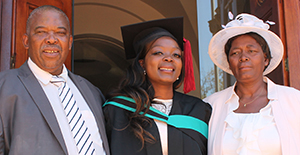
|
In was a joyous occasion for the Hlomuka family when their last-born walked across the stage to receive her degree. Spontaneous ululating sounded from the crowd as Nozipo Hlomuka knelt before the Chancellor of the University of the Free State (UFS), Dr Khotso Mokhele, who conferred her degree.
“At that moment, I thought ‘this is really and finally happening’,” says the young teacher from Qwaqwa, who received a B Ed degree at the spring graduation.
At that moment time stood still for Nozipo, who once believed that, because of financial difficulties, this day would never come.
Across our three campuses, there are many students in similar positions to Nozipo. As many as 60% of students on our campuses are food-insecure, and suffer from hunger. The No Student Hungry Bursary Programme as established in 2011 to provide food-insecure students with a modest food bursary.
In 2014, just when Nozipo thought she could no longer continue studying, she became the recipient of an NSH-bursary.
Although receiving a degree is a huge achievement for Nozipo, her parents, too, were overcome with emotion, to see the first of their five daughters reach this academic milestone. Having only finished grade 8, Mrs Notula Hlomuka, Nozipo’s mother, says it was important for her to see her children finish school, at least. Mrs Hlomuka sold fruit and vegetables which provided the family’s only income.
“It was not always easy. It was never easy. Sometimes, there was no money and not enough to eat, and your children must go to school hungry. We could not afford new clothes for all the children, and the school uniforms were handed down to the younger sibling ending with Nozipo. Those were difficult days. It’s over now. God provided.”